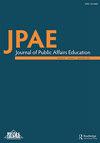The status of public administration teaching in the UK
IF 2
Q1 EDUCATION & EDUCATIONAL RESEARCH
引用次数: 1
Abstract
The teaching of public administration in the UK could be described as at best multifaceted or fragmented. It suffers from a combination of disinterest from practitioner organizations, disregard from universities and disaffection from many academics. Whilst public administration research flourishes in terms of funding, publications and all-important impact, the teaching of public administration remains something of a poor cousin. A reading of the British public administration literature confirms that this status is not new but is a longstanding source of frustration for those who believe it warrants greater attention. Yet there are many reasons to celebrate the multifaceted nature of teaching public administration— not least of which is the continued presence and strength of the UK Joint University Council for Social and Public Administration (the JUC). The JUC was established in 1918, as a learned society with the aim of “the coordination and development of the work of social study departments in Great Britain and Ireland” (JUC, 1935 as cited by R. A. Chapman, 2007, p. 8). Since then it has, through its Public Administration Committee (PAC), been the leading voice for public administration (PA) in UK. Alongside the annual conference, national representation on key committees, societies and funding bodies, the PAC provides funding for members to conduct research or host events and publishes two academic journals—Public Policy and Administration and Teaching Public Administration. In a challenging environment, the PAC provides a crucial network for PA educators and researchers in the UK (Elliott, 2018). As the representative voice of universities that teach and research PA, it facilitates shared practice and teaching innovation across the UK and internationally through its relationship with international networks including the International Institute of Administrative Sciences (IIAS). Arguably, the most comprehensive overview of PA education in the UK was undertaken on behalf on the PAC almost 50 years ago (R. Chapman, 1973). The Chapman Report outlined the state of PA education, training and research programmes across UK schools, colleges and universities. Since then, many more commentaries have followed (Chandler, 1991, 2002; R. A. Chapman, 1982; Elcock, 2004; Fenwick & Macmillan, 2014; Greenwood, 1999; Johnston Miller, 2012; Jones, 2012; Ridley, 1972; Robson, 1975; Wright, 1974). In line with the perspectives set out in Chapman’s work, common themes articulated in these contributions are those of decline and decay. But what we find is that despite these death knells, the PA community in the UK remains strong and teaching of PA continues to adapt, flex and innovate. This editorial proceeds as follows. The next section provides a brief history of UK PA as a taught discipline. This is followed by an oversight of the current political context including public service standards and behavior. From this, the status of PA teaching in the UK is addressed. The editorial concludes on an optimistic note, outlining how practitioners and academics can work together to ensure that the craft of PA remains intact across the UK. JOURNAL OF PUBLIC AFFAIRS EDUCATION 2023, VOL. 29, NO. 3, 262–274 https://doi.org/10.1080/15236803.2023.2202609英国公共管理教学现状
英国的公共管理教学最多只能被描述为多面性或碎片化。它受到来自实践组织的不感兴趣,来自大学的漠视和来自许多学者的不满的综合影响。虽然公共行政研究在资金、出版物和所有重要影响方面蓬勃发展,但公共行政的教学仍然是一个可怜的表弟。对英国公共管理文献的阅读证实,这种状况并不新鲜,但对于那些认为应该给予更多关注的人来说,这是一个长期困扰他们的问题。然而,有很多理由庆祝公共管理教学的多面性——其中最重要的是英国大学社会与公共管理联合委员会(JUC)的持续存在和实力。英国大学行政委员会(JUC)成立于1918年,作为一个学术团体,其宗旨是“协调和发展英国和爱尔兰社会研究部门的工作”(JUC, 1935年,引用R. a . Chapman, 2007年,第8页)。从那时起,它通过其公共管理委员会(PAC)一直是英国公共管理(PA)的主要声音。除了年度会议、主要委员会、学会和资助机构的国家代表之外,PAC还为成员提供资金进行研究或举办活动,并出版两份学术期刊——《公共政策与管理》和《公共管理教学》。在一个充满挑战的环境中,PAC为英国的PA教育者和研究人员提供了一个至关重要的网络(Elliott, 2018)。作为教学和研究PA的大学的代表,它通过与包括国际行政科学研究所(IIAS)在内的国际网络的关系,促进了英国和国际上的共享实践和教学创新。可以说,英国最全面的PA教育概述是在近50年前代表PAC进行的(R. Chapman, 1973)。查普曼报告概述了英国学校、学院和大学的私人助理教育、培训和研究项目的现状。从那时起,更多的评论接踵而至(Chandler, 1991,2002;R. A. Chapman, 1982;Elcock, 2004;Fenwick & Macmillan, 2014;格林伍德,1999;约翰斯顿·米勒,2012;琼斯,2012;里德利,1972;罗布森,1975;赖特,1974)。与查普曼的作品中提出的观点一致,这些贡献中阐述的共同主题是衰落和衰败。但我们发现,尽管敲响了丧钟,英国的私人助理社区依然强大,私人助理教学也在不断适应、灵活和创新。这篇社论的内容如下。下一节将简要介绍英国公共关系管理作为一门教学学科的历史。其次是对当前政治环境的监督,包括公共服务标准和行为。由此,论述了PA教学在英国的现状。这篇社论以一种乐观的语气总结,概述了从业者和学者如何共同努力,以确保私人助理的工艺在英国保持完整。《公共事务教育学报》2023年第29卷第2期。3,262 - 274 https://doi.org/10.1080/15236803.2023.2202609
本文章由计算机程序翻译,如有差异,请以英文原文为准。
求助全文
约1分钟内获得全文
求助全文
来源期刊

JOURNAL OF PUBLIC AFFAIRS EDUCATION
EDUCATION & EDUCATIONAL RESEARCH-
CiteScore
5.00
自引率
36.00%
发文量
34
 求助内容:
求助内容: 应助结果提醒方式:
应助结果提醒方式:


